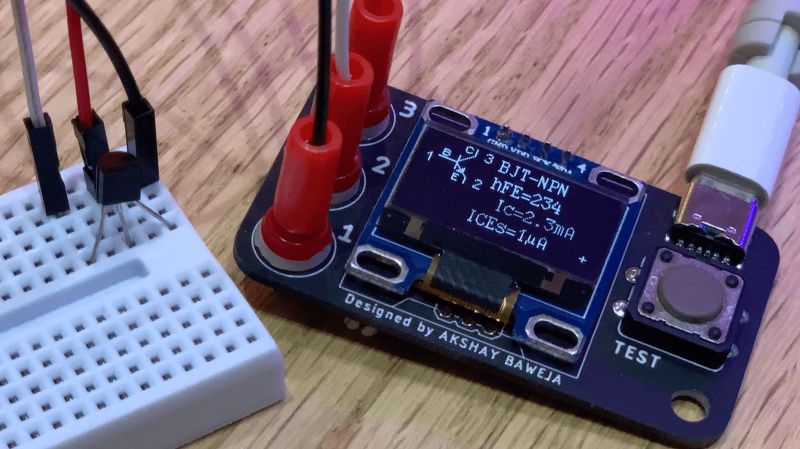The ideal component tester is like a tricorder for electronics — it can measure whatever it is that you need it to, all the time. Maybe you have a few devices like an ohmmeter and maybe a transistor socket on our multimeter. But what do you do when you need to see if that thyristor is faulty? [Akshay Baweja] wants an everything-tester at the ready, so he’s building a comprehensive device that fits in a pocket. It will identify the type and size of:
- Resistors
- Capacitors
- Inductors
- Diodes
- Transistors
- Thyristors
- TRIACs
The key to its small size is the USB-C power port instead of an onboard battery and accompanying charging circuitry. On the back of the custom PCB is an ATMEGA328 and the front sports an OLED screen, three testing pin sockets, and a button.
We appreciate how the controller doesn’t care what order you connect the pins, and it figures out what the test subject is and the function of each lead. Results appear on the screen until you load a new component and press the button again. A function generator feature sets it apart from the run-of-the-mill testers out there, but it doesn’t have an audible continuity meter.




















Cool, been wanting to do something along these lines, this looks like a heck of a good line to start along, well done nice mix and thanks for posting :-)
Please clarify: It looks like she built the hardware, but (most of) the software is based on the well known and well copied Transistortester from a german forum. Yes, she still did something, but the real magic is in the parts-identification-algorithms.
This. By all means stand on the shoulders of giants, but do give them the credit where it is due.
In the HACKADAY.IO article [Akshay Baweja] says this: “It is based on the popular AVR TransistorTester.” But does’t provide the link to the original AVR TransistorTester work. So I’ll do it instead:
https://www.mikrocontroller.net/articles/AVR_Transistortester
Thanks for pasting it here again :)
But I have linked it in the project details since project description box does not allow you to add hyperlinks.
I don’t know if it was edited, but the .IO project does have a link in that same first paragraph when I looked at it.
To be fair to Akshay: its stated right in the first paragraph on the project page that its based on the TransistorTester. Should be said here in the article as well, though.
Nice Idea for a badge!
That’s correct planning a badge version too ;)
You can also find instructions here:
https://www.instructables.com/id/Component-Tester-in-a-Keychain/
I built three so far. Fun to build and they work well.
Clickbait title. You have to lug around a USB cable, battery pack and the test leads in your “pocket”…
Maybe one could be built with a wireless charging receiver. Then if you have one of those phones that can wireless charge other phones you could just lie the tester on the back of your phone to use it.
Of course just plugging into the usb port on the phone for power would be more efficient and work with a wider variety of phones. But then you need to carry the cable.
I did something like this with a PirateBox. I love being able to toss it on a charging pad and a minute later, I can connect.
http://www.24hourengineer.com/2019/10/2019-10-22-tu-pirateboxqi-completed.html